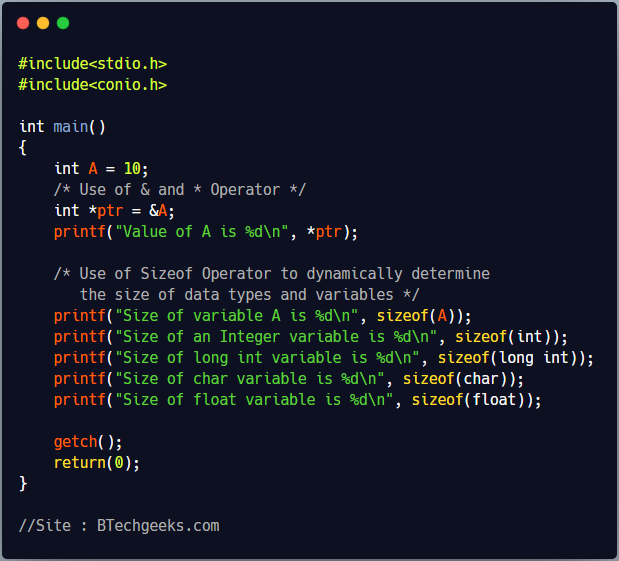- C programming language supports various operators to perform various operations like logical, mathematical, relational, arithmetic, bitwise operators etc. In this tutorial we will learn about various C operators in brief with sample programs.
An operator in C is a symbol used to perform logical and mathematical operations in a C program.
A statement containing operators and variables is called an Expression. C operators connects constants and variables to form expressions.
For Example
In 2 x (length + breadth);
- x and + are operators
- 2 is a constant
- length and breadth are variables
- “2x(length + breadth)” is an expression, performing one logical task
C programming language is rich in built in operators. Here is the list of operators supported by C language.
- Arithmetic Operators
- Assignment Operators
- Bitwise Operators
- Logical Operators
- Relational Operators
- Conditional Operator
Special Operators in C
Below are some special operators supported by C language.
| Operators | Description | Example |
|---|---|---|
| * | It represents a pointer to a variable. | int *ptr; ptr is a pointer to variable of data type int. |
| & | Returns address of the variable. | &Val will give address of Val variable. |
| Sizeof() | Returns the size of a variable or data type. It is not a function. | Sizeof(int); Returns the size of integer data type. |
Address of Operator(&)
The & is a unary operator in C which returns the memory address of the passed operand. This is also known as “address of” operator.
A pointer contains the memory address of some object.
Value of Operator(*)
The * is a unary operator which returns the value of object pointer by a pointer variable. It is known as value of operator.
It is also used for declaring pointer variable.
For Example
int A = 100;
int *ptr = &A;
In the first statement, we first declare an integer variable and initialize it with value 100. In second statement, we are declaring a pointer to a variable of type int and initializing it with address of A.
Sizeof Operator
The sizeof is a compile time operator not a standard library function. The sizeof is a unary operator which returns the size of passed variable or data type in bytes.
As we know, that size of basic data types in C is system dependent, So we can use sizeof operator to dynamically determine the size of variable at run time.
C program to show use of Sizeof, & and * Operator

#include<stdio.h>
#include<conio.h>
int main()
{
int A = 10;
/* Use of & and * Operator */
int *ptr = &A;
printf("Value of A is %d\n", *ptr);
/* Use of Sizeof Operator to dynamically determine
the size of data types and variables */
printf("Size of variable A is %d\n", sizeof(A));
printf("Size of an Integer variable is %d\n", sizeof(int));
printf("Size of long int variable is %d\n", sizeof(long int));
printf("Size of char variable is %d\n", sizeof(char));
printf("Size of float variable is %d\n", sizeof(float));
getch();
return(0);
}
Output
Value of A is 10 Size of variable A is 4 Size of an Integer variable is 4 Size of long int variable is 4 Size of char variable is 1 Size of float variable is 4
Operator Precedence
An expression in C may contains more than one variables and operators. Not every operator in C is of same precedence, some operators are of higher priority than others; for example increment operator(++) is of higher precedence than addition operator(+). Operator precedence defines the sequence of evaluation for operators of an expression, to resolve and ambiguity.
For Example
X = 1 + 2 * 3;
Without any Operator precedence, above expression can be evaluated in two different ways producing two different values for X.
Performing addition before multiplication
X = 3 * 3 = 9
Performing multiplication before addition
X = 1 + 6 = 7
To resolve this confusion, we assign different precedence to different operator. As the precedence of multiplication is more than addition, Correct value of X is 7.
The associativity specifies the operators direction to be evaluated, it may be left to right or right to left.
Below table lists the operators in decreasing order of their precedence.
| Operator | Associativity |
|---|---|
| () [] -> . | Left to right |
| ! ~ — ++ (type)* & sizeof() | Right to left |
| / * % | Left to right |
| – + | Left to right |
| << >> | Left to right |
| < <= > >= | Left to right |
| == != | Left to right |
| & | Left to right |
| ^ | Left to right |
| | | Left to right |
| && | Left to right |
| || | Left to right |
| ?: | Right to left |
| = += -= *= /= %=>>= <<= &= ^= |= | Right to left |
| , | Left to right |
Points to Remember
- If two operators of same priority appear at a same level, more priority is given to the operator appearing first.
For Example :
X = A*B + C/D;
In above expression, * and / both have the same priority but * will be evaluated first as it appears first. - In any expression containing parentheses, innermost parentheses is given more priority then the outer one and so on.
For Example :
X = 2 * (3 + 4);
X = 2 * 7; /* + gets evaluated first because of parentheses */
X = 14;
